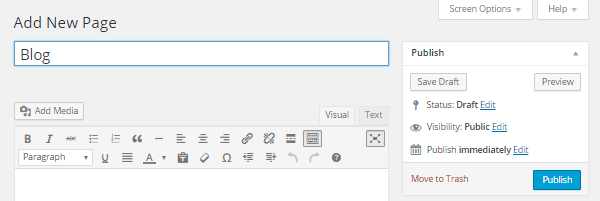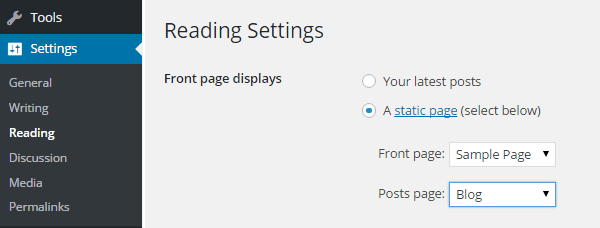Considering you built your website with WordPress, it might seem a bit strange to some that it doesn’t feature a blog. However, when you’re working hard on and in your business, it can feel like the last thing you can justify spending time on is blogging.
This makes sense. You’re a freelancer or business owner, designing and developing your way to success. Your website is finished. It looks great, has excellent sales copy, and offers a positive user experience. Your visitors can easily see what you have to offer and view glowing testimonials from previous clients and customers to back up those claims. Yet somehow, you’re still not getting enough business coming your way.
This could be because there’s one thing you’ve overlooked on your website: adding a blog. So why should your business website have a blog?
In this article, I will try to convince you why your business website needs a blog and then finish off with a few pointers on how to get started. By the end of this post, you’ll be able to make an informed decision as to whether blogging can help your business or not and if content marketing is a valuable use of your time and resources.
So, let’s start out with a quick overview of content marketing and how it can help your business grow.
- 1 What is Content Marketing?
-
2
Top Reasons Why Your Website Needs a Blog
- 2.1 Reason #1: More Opportunities to Be Found
- 2.2 Reason #2: Opens up the World of Social Media Marketing
- 2.3 Reason #3: More Time to Connect with Your Targets
- 2.4 Reason #4: Another Chanel of Communication
- 2.5 Reason #5: More Networking Opportunities
- 2.6 Reason #6: Shameless Self-Promotion
- 2.7 Reason #7: Create Content Specific Lead Magnets
- 2.8 Reason #8: An Overall SEO Boost for Your Website
- 3 How to Start Your Blog Today
- 4 Wrap Up
What is Content Marketing?

Content marketing can take many forms – image by mayrum / shutterstock.com
Content Marketing is a marketing strategy that is based on creating and sharing content of value with your community or target audience, thus establishing yourself as an authority in your field. It helps build a strong relationship with your readers and potential customers and ultimately leads to increased sales without the need for traditional hard selling.
One very popular form of content marketing it to post great content to your blog on a regular basis. Instead of traditional outbound marketing, such as advertising and cold calling, where you go to your audience, the goal of inbound marketing, or content marketing, is to have your audience come to you.
If you’re averse to selling yourself and self-promotion, then this should sound like a form of marketing that is right up your alley. However, if you’re still not entirely convinced or you want to know more, let’s break it down further with the top reasons why your website needs a blog.
Top Reasons Why Your Website Needs a Blog

Blogging can grow your business in many ways – image by Legend_art / shutterstock.com
So now that we’re all on the same page when it comes to the topic of content marketing, let’s take a look at some concrete reasons why you should add a blog to your website and start publishing content on a regular basis.
You could even use these reasons to persuade your web design clients why they need a blog as part of their website package, making it another additional value-added service you can add to your portfolio.
Reason #1: More Opportunities to Be Found
A typical business website may only consist of 5-10 pages, including those essential pages you might’ve forgotten. While that could be enough to sell your proposition, it might not be enough to get your potential clients and customers to your website in the first place. That is where a blog comes in.
You see, each post you publish on your blog is another page of your website that is indexed in the search engines. This means it’s another chance for your website to be found by people searching the web. If you’re employing the core tactics of content marketing and using your blog to answer the questions and queries of your target audience, then when they turn to Google in search of a solution to their quandary, with a bit of luck and some good old-fashioned SEO, your blog posts may well be displayed in the results pages. This then brings more targeted traffic to your website.
Your ideal customers and clients are probably already hanging out on social media; therefore, you should be there too so that they can find you. As well as sharing content you’ve discovered that your audience will find useful and responding to any queries related to your industry that you come across, sharing your own content is something you should be doing on social media to get more visitors to your website.
However, if your site only has a few pages, all of which are focused on selling your business, then there’s only so many times you can share that content before it starts getting old.
But, with a busy blog, which regularly publishes useful content that answer questions, solves problems, and gives great value, you’ve suddenly got something to share on social media. Each tweet of a blog post is an action that has the potential to grow the number of leads heading to your site.
Not only do you now have something of your own to share on social media, but the visitors that reach your site also have something to share of yours if they wish. By using a versatile social sharing plugin like Monarch, no matter what social network your content or niche is best suited to, you can make it as easy as possible for your visitors to promote your content to their followers.
If you do take our advice and start a blog, be sure to read our guide covering how bloggers can leverage social media to get more targeted traffic to their content.
Reason #3: More Time to Connect with Your Targets

Connect with your target audience – image by La1n / shutterstock.com
While your website’s essential pages might be perfectly crafted, sometimes a visitor just wants more before they are ready to become a client, customer, or subscriber. Maybe they want to be sure you know your stuff, want more answers to their questions, want to get to know you better, or even be sure that you are still in business.
A regularly updated blog can help with all of this. Well placed links in the sidebar, header, or footer to your blog or its best articles can make it easy for your visitors to extend their stay on your site. This can then help them to get a better sense of who you are and what you have to offer.
The home, about, services, and other core pages of your website should be concise and to the point. Your blog, on the other hand, offers more creative license and gives you the freedom to express your values, views, and personality with your target audience.
With a blog, you now have a chance to win over those visitors that aren’t sold on your sales page alone. Furthermore, by also taking advantage of email marketing and using a plugin like Bloom, you can give yourself another chance to connect with those visitors who still aren’t ready to pull the trigger but also aren’t quite ready to walk away for good.
Reason #4: Another Chanel of Communication
Each post on your blog and its accompanying comment form gives your audience another opportunity to get in touch with you. Some visitors might not have the time or think that their question warrants an email or message via your contact form. However, their query might be perfectly suited to be left as a comment at the end of the post they’ve just read.
When this happens and you’re lucky enough to have the opportunity to reply to their comment, use this chance to start a discussion and assist them, all the while demonstrating your knowledge, expertise, and willingness to help. If you’ve enabled reply notifications that are sent out to your readers who have left comments, you now have another way to bring those one-time visitors back to your website that you didn’t have before.
Yes, responding to comments can be time-consuming. However, if you set a brief window aside each week to moderate and respond to useful comments you can not only deliver extra value to your commenters but also any other visitors who read those posts. Comment spam is a very real issue too, but it’s one that can be minimized.
If you are worried about negative feedback being left on your blog, there’s no need. Responding to those negative comments in a calm and collected way demonstrates that you are willing to listen to your customers and won’t lash out when things don’t go your way. Anyway, you’re under no obligation to approve all comments – it’s your blog after all. You never, know you might even get some unsolicited praise and feedback left as comments for other visitors to see.
Having a visitor open a channel of communication with you can be invaluable and blog comments are a valid way of facilitating this.
Reason #5: More Networking Opportunities
By sharing what you are up to on your blog, or featuring other players in your industry that you are impressed with, you can initiate some useful networking opportunities.
Maybe someone will be impressed with what you’ve been working on, or someone else will reach out to thank you for mentioning them on your blog. Perhaps a potential business partner will see that you are both attending the same conference and make a point to seek you out there.
You don’t have to go as far as highlighting your direct competitors and risk losing business. However, if you are a theme designer, by mentioning an impressive plugin that’s just been released, or a new hosting service, you will not only be sharing useful information with your audience but also laying the foundations for a potential partnership.
Reason #6: Shameless Self-Promotion
No one likes a braggart. However, if you frame it in the right way, your blog can be a great way to share projects you’ve completed, clients you’ve landed, or accolades your been awarded.
Some businesses even share their revenue and income reports on their blogs. At first glance, this might seem like nothing more than grandstanding. However, if you include the things you’ve learned and share what went well and what didn’t, you’ll be providing real value in these posts. This then makes them more than simple financial reports and can be a great way to ensure your visitors come back the following month for the next installment in your story.
Publishing information about your revenue, notable clients you’ve landed, or projects you’ve completed also shows that you are the real deal and not just a new venture in its first month of business. This should help make it a little easier for your potential clients to decide to trust you with their business.
Reason #7: Create Content Specific Lead Magnets
The main goal of your website might be to convert each visitor into a customer or client from the outset. However, your secondary goal should be to find a way to keep in touch with them until they are ready to sign on the dotted line.
Creating a focused email marketing campaign is one very effective way of doing this. Get a visitor onto your email list and you can send them valuable content on a regular basis until they are won over, their budget permits, or for whatever reason they are finally ready to take action and start working with you.
A proven way to encourage a reader to join your email list is to offer a lead magnet – a free incentive given in exchange for signing up. However, it can be hard to create the perfect lead magnet that all your readers will want to get access to. When it comes to producing a lead magnet, one size rarely fits all.
However, by creating multiple lead magnets and pairing them with specific types of content on your blog, you can make them much more targeted and, therefore, more likely to convert. For example, someone lands at your site on a post on why responsive design is so important. The newsletter signup form on that page offers a free responsive design checklist in exchange for their email address. Meanwhile, a blog post on how to make a website faster offers a guide on reducing your page loads times as a lead magnet.
This might sound like a lot to manage. However, by choosing a professional email marketing service, it’s a lot easier to implement than its sounds.
Reason #8: An Overall SEO Boost for Your Website
As well as having more content from your site indexed in the search engines, there are a few other SEO related benefits of adding a blog to your business website.
In basic terms, the more often content is published on your website, the more often the search engine crawlers will visit your website and the faster new content will be indexed. This means that an important announcement you make or timely content you post stands a much better chance of being found faster by your audience, compared to if you’re website was dormant for long periods.
Search engines don’t want to send their users to out of date content and abandoned websites. Regularly publishing content on your blog is one way to signal to search engines like Google that your website is alive and well.
Acquiring links from other websites that point to yours is still one of the most effective ways to improve the search engine rank of your content. While, we’re not suggesting you go out and artificially build backlinks, each article you publish on your blog is another piece of content that another website might want to link to. Sales pages are hard to earn backlinks for, but it’s a lot easier for a useful blog post that provides a wealth of value.
How to Start Your Blog Today
There you have it: eight solid reasons why you should add a blog to your website. Now that you’re convinced, you might be wondering what the best way to start is. So, here’s some advice on beginning your blogging journey.
Step #1: Setting Up the Blog in WordPress
In most cases, the homepage of your business website is probably set up as a static page, rather than an archive view of your most recent blog posts. We don’t recommend you change that, so the best way to help your visitors find your blog content is to create a new blank WordPress page called ‘Blog’.

First create a page to display your posts
Once you’ve published that blank page, head over to the Reading Settings and select that new page from the Posts page drop down list.

Then tell WordPress where to display your posts
The link to this page should now be added to your navigation and menu areas. When visited, this page will then list your most recent blog posts.
Step #2: How to Write Traffic and Lead Generating Blog Posts

More traffic and leads are on the way – image by blocberry / shutterstock.com
Now that the technicalities are out of the way, it’s time to start thinking about content creation. This is a whole other topic in itself but some essential things to think about include:
Establishing Your Target Audience: By being aware of this, you can always ensure that your content is speaking to your ideal customer or client. Having your target audience in mind makes it easier to write content and stay focused on your goals. Think about who your previous clients have been, what problems you can solve, and whom you’d love to work with.
Create a List of Blog Post Topics: Now that you know whom you are writing for, it’s time to come up with a list of blog topics that they will find useful. An easy way to do this is think of all the questions your clients have when they first make contact and while you are working together. Check through your inbox for questions you’ve been asked and issues that have arisen.
Find Your Blog’s Voice: Armed with your list of blog topics, it’s time to start writing. However, if you are new to blogging it can be hard to know what approach to take. Should your voice be formal and business-like or more chatty and conversational? It’s up to you to establish what suits you and your industry and target audience best. While it’s good to be consistent, it’s also fine to experiment in the early days until your true voice emerges.
Content Creation: If the thought of writing long articles (like this one) doesn’t appeal then the good news is there are plenty of different formats your blog posts can take. Consider simple how-to guides, news, list articles, and round-ups of other useful content you’ve discovered.
Schedule Content: There are plenty of great content scheduling plugins for WordPress. However, to start with, simply choose a frequency such as two posts a week, decide which days of the week your posts will go live, and then allocate a topic to each day. This will ensure you always know what you should be writing about when you get down to work and will help you get in and out as quickly as possible.
Things to Remember: According to entrepreneur and online marketing expert Gary Vaynerchuk, each piece of content that you publish should achieve at least one of the following: inform, entertain, and educate. Maybe you can pull off all three, but for most industries and blogs, one should suffice.
Hire an Expert: If this all sounds like too much work and time that will take you away from what you do best and the core focus of your business, then you might want to think about outsourcing this task. A simple Google search for ‘freelance blogger for hire’ should give you plenty of options to explore. Another way to find a suitable writer for your blog is to check out who writes for your favorite blogs and get in touch via their author bios.
Wrap Up
Blogging can help your business website get more traffic and give you more opportunity to turn leads into clients and customers. If you do it right, content marketing can be a new way to grow your business and could even end up becoming an additional service you can offer your clients.
Blogging isn’t always easy. However, if you follow the above advice and commit to publishing new content on a regular basis, you blog’s ability to generate more leads can snowball over time. This will then reduce your reliance on word of mouth referrals, outreach, and paid advertising.
Why doesn’t your website have an active blog? What’s been stopping you growing your business with blogging? What do you need help with when it comes to starting a blog? Please let us know your thoughts in the comments below.
Article thumbnail image by La1n / shutterstock.com









Anyone know of any good ways of writing a blog using Siri, or similar?
I’m guilty of not maintaining my blog as much as I should, purely out of time it takes to research and type it up (lazy I know), but I have spoken with like-minded people who use dictation or their Siri to speak whilst driving/walking to save them typing their article up.
Very Interesting!!
Such a nice blog. I am totally agree with you. A website must have the blog if an online business needs to grow.
Reason #7: Create Content Specific Lead Magnets – Really Very Effective
Sounds like there are lots of benefits to having a blog. Can you explain or direct me to another article how to set up the blog so that subscribers get an email when you create a new post on the blog? How do we connect the blog post and the subscriber? Every time I research this, it gets very confusing.
Thanks for your help.
Check out pat flynn at smart passive income. He has everything and more than you could ever need on about blogs, podcasts and social media. His podcast material is different to his blog material. Everything he puts out there is absolutely golden. Definitely check him out – he’ll open up a whole new world to you and good luck!
I agree with all your points yet it’s so difficult.
May I ask a specific question to you Joe. How long does it take for you to come up with a great article like this one? I’m trying to start my own blog but I feel like I’m losing too much time planning, writing posts and finding interesting graphics, images for the post.
Also I’ll give you a new idea for a blog post. What should I do to make this blogging process faster? What kind of tools I can use?
And how often should I post on my blog page?
Hi Joe
Just the article that I need to try and persuade clients to add a blog to their website.
Most small businesses realise that they must have a website but few see the benefits of having a live and active blog, with each post targeting a specific aspect of their business.
Of course the other big problem is teaching clients how to write a good quality blog post with eye catching graphics.
Thanks, Keith.
Yes, actually writing the content can be a whole other challenge especially for busy business owners.
This article is like an red alert for me as I am also behind with my blog. I know how important it is but I am just too lazy.
Thanks for the heads up.
Great article. Passing it along to all of our clients.
Hi Ben, and Joe, same here, we always advise our clients to write blog posts on a regular basis, and we even set up an editorial calendar plugin for them, but the usual excuses are “we don’t have time to write articles”, or “we wouldn’t know what to write about”. This article covers both, so we will be circulating it far and wide! 🙂
Thanks Terry and Ben, that is really great to hear!
I’ll be doing an article shortly with more info on how to get started with business blogging, for those that are convinced of the benefits.
Sometimes I think getting a root canal would be less painful and easier then writing and maintaining a blog. But after reading your article it is a necessary evil. With your advise it appears to be easier if you break it down into target audience, target topics, and come up with a schedule for release. As suggested I will get a professional writer to spit and shine my copy.
Thanks for you insights and nudge in the right direction.